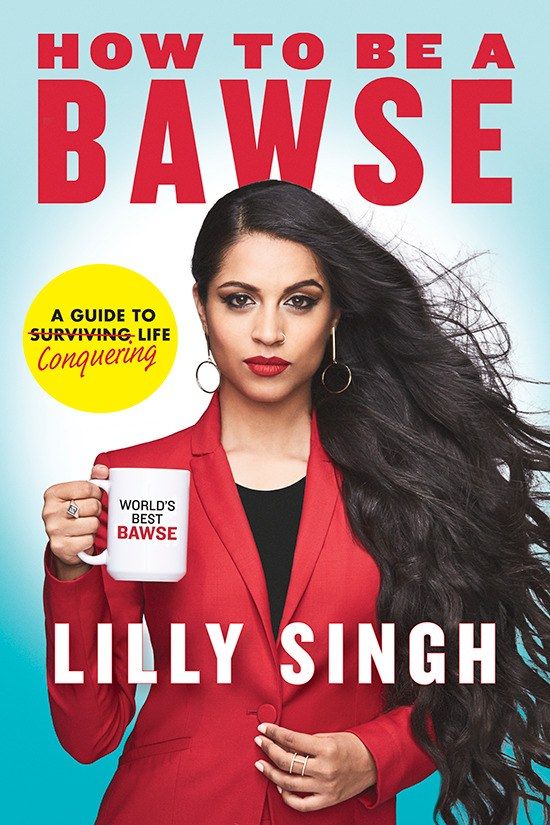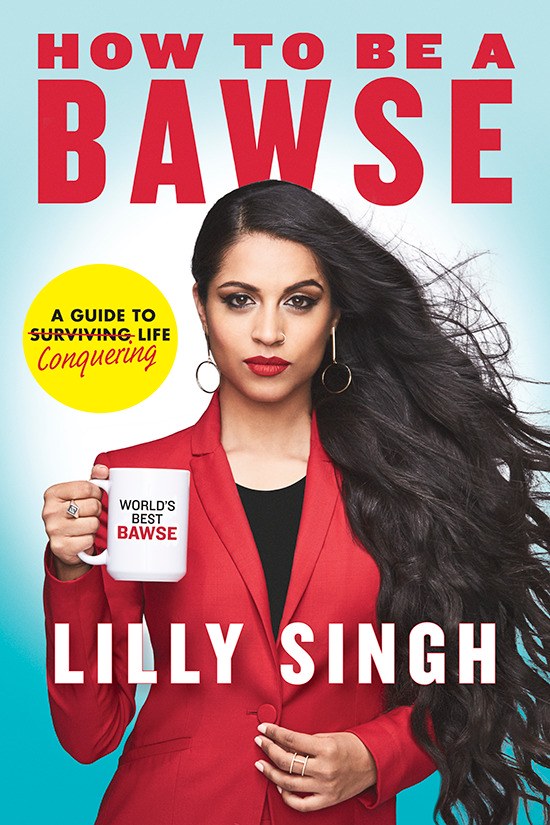YouTube Superstar Lilly Singh: “One of the Most Controversial Things I’ve Ever Said Was That I’m a Feminist”

Ask YouTube superstar Lilly Singh (a.k.a. ||Superwoman||) what’s next for her nonstop schedule, and you’ll get a two-part answer. There’s the “specific” game plan—a two-month world tour followed by a return to Los Angeles to focus on longer-format, higher-produced content—but then there’s what she calls the “general” game plan: “good old-fashioned world domination.” With more than 11 million subscribers, she’s already well on her way to that last part.
Many would be fine to stop there, but Singh has also landed roles in Bad Moms and Ice Age: Collision Course, launched her own lipstick with Smashbox, starred in and produced a feature-length film about her first world tour, A Trip to Unicorn Island, and created an important initiative for young women to break the cycle of girl-on-girl hate called #GirlLove. And now her latest move toward world domination is a new advice book: How to Be a Bawse: A Guide to Surviving Conquering Life.
Here, Singh opens up about how the book came to be, her history with depression, and why calling herself a feminist was the most controversial thing she’s said. Read on.

Glamour: So you’ve obviously been busy…. Why now for the book?
Lilly Singh: When I decided to write a book, I was adamant about not making a piece of merchandise. Of course, there were a whole bunch of publishers who were like, “Write a book! It’ll be so great!” But I was like, “No, I don’t want to write a book to sell a book. I want to write a book because I have something to say, a point of view.” I knew I wanted it to be based on the place I was in my life. I was really happy with my career; I was really happy with my professional and personal life. I wanted to extract the lessons I’ve learned and put them in a book. And aside from me personally feeling like I was in the right place in my life, I’m also a big advocate for bringing back the art of working hard. I think, as a millennial, we’re in this unique time with social media and cute quotes in Instagram…everyone just feels so validated all of the time. You know what I mean? There’s this idea that people have to wish and hope for their dreams, but I want to bring back the art of working for them. I feel like that’s been a little lost and forgotten. That’s what this book is. It’s kind of a mixture of an old-school-mentality work ethic mixed with innovative ideas on how to be successful.
Glamour: The parts that really struck me were the “Out of the Blue” sections. In them, you’re very open about a time in your life when you were fighting depression and then compare that to what your life is like now. Can you tell me more?
LS: The “Out of the Blue” sections were definitely the most difficult to write and record in the audiobook. I’ve talked about some of those experiences before, through my videos, but I’ve never talked about them the way I did in the book, which is very much raw and a stream of consciousness. This wasn’t filtered; it’s what I actually felt. It was important for me to include those because, if I’m being honest, I don’t want people to think that I have 2 billion views and 11 million subscribers [so] I’m qualified to give advice. These sections were like, No, I literally have been through something that I feel validates what I’m saying.
Glamour: I’m sure your fans, especially ones who are also dealing with depression, appreciate you being so open.
LS: Some of the greatest comments I get—whether online or in person—are always like, “Because of you I feel comfortable talking about depression,” or “I feel more confident in myself.” One of the best feelings and remedies for a lot of things in life is feeling like other people can relate. That’s a lot of what my brand and me as a person—that’s what I do. Whether it’s comedy or something a little more serious, it’s this idea that people watch and think, I thought I was the only one! But I’m not! This person relates to me! Then you look at the comments and see a gang of other people who relate to you; that’s the beauty of the Internet and my community and talking about things like this. I mean, that’s what helped me when I first started YouTube in 2010. I was sad, so I made a video. And as somebody who felt very alone, I somehow felt less alone through building this community of people online.
Glamour: Can you tell me more about your #GirlLove initiative?
LS: #GirlLove is a social campaign I started about a year and a half ago. The aim is to end the cycle of girl-on-girl hate and encourage specifically young girls that it’s cool to support other women. I’m very grateful to be in this time of when I do things, people think it’s cool, even though I think I’m a huge nerd. Something I want them to pick up is that it’s cool to support other women. There’s this idea that girls need to be hostile toward each other when that doesn’t actually need to be the case. When I was in high school, that was very much the case. Every girl thought that. We need to have drama, of course; we need to have cliques because that’s what they show in the movies. But only when women come together will we truly be able to tackle the larger issues that we face around the world.
Glamour: With the YouTube community, you work together and collaborate even though you’re each other’s competition.
LS: Honestly, the digital community is great in that sense. I write about it one of the chapters of my book. It’s about how there’s a healthy competition, naturally, among the creators. It’s necessary! It helps the evolution of any industry. But, at the same time, if I ever have a contract where I was like, “I have no idea about this—let me call my creator friend,” she would totally help me. We very much have each other’s backs. There’s a cool sisterhood in the digital community that I’m proud of. I had my book launch party, and so many of my creator friends showed up to show support. They’re so busy, so it was really cool to see.
Glamour: That’s awesome to have that support, especially because the comments on the Internet get so nasty.
LS: It’s dark. It’s sick. But, you know, my mantra with that is: Only unhappy people would wake up and be like, “Let me write something really mean to some random stranger on the Internet.” Happy people don’t do that. I always try to remind myself that if there’s a really nasty comment that person is telling their story, not mine.
Glamour: You talked in the book about getting so many sexist comments….
LS: Mmm, my favorite.
Glamour: …when you did a video about why you don’t need to be in a relationship. That happens to so many women—people passing judgment on their life choices.
LS: I was just telling someone that one of the most controversial things I’ve ever said was that I’m a feminist. To this day, anytime I talk about anything related to women’s issues, it’s probably the most backlash I receive.
Glamour: That’s insane.
LS: It is insane! I think there’s still a certain level of intimidation and confusion that comes around a strong female voice. That video is a prime example of it. I have tons of videos about cute boys and what I like in a boy, and those are all very popular, but the second I was like, “I don’t need a boyfriend, and I’m going to tell you why,” there were a lot of angry guys in those comments. They would say things like, “Oh, something must be wrong with you then.” I’m like, “No, I just don’t want to be in a relationship. I just don’t care. Is something wrong with that?” There was a lot of backlash; that’s really super common if I speak about anything related to women being independent. That’s why #GirlLove is so important. I’m trying to do my part, you know? One video and tweet at a time! [Laughs.]

